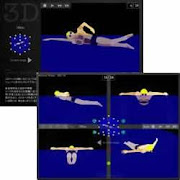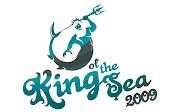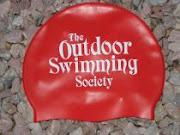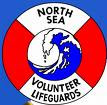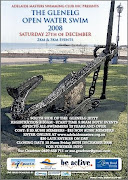
This is how NBC describes the newest sport at the Olympics:
25 athletes swim four 2.5-kilometer loops in the Olympic rowing basin. Prior to the start, the swimmers are marked with numbers in black ink on their wrists, arms and shoulder blades for identification purposes. The swimmers are also given two wrist transponders that enable accurate timing.
The swimmers are given a warning every minute beginning five minutes before the race start. They are also given a 30-second warning and must have one foot on the edge of the dock at the start. The swimmers dive in from a floating start pontoon when they hear the air horn start.
Throughout the race, the swimmers swim in large packs drafting off one another, each trying to gain a positioning advantage over one another, often inadvertently bumping and hitting each other.
Over the course of the 1 hour 50-55 minute race, the swimmers can choose to receive hydration from their coach who is standing on a floating feeding pontoon. There are two feeding stations on the west side of the course, but each swimmer and coach must decide which one of the two stations is best suited to their strategy. If a swimmer misses a feeding, they store gel packs in their swim suits that they can take at any time during the race when they quickly roll over on their back.
There are large turn buoys at each of the four corners of the course. Each swimmer must round the turn buoys on their left shoulder. There are also many intermediate buoys along the course, but the swimmers can swim on either side of these buoys at their choice.
There is much physical contact as the pack swims along the course, especially around the turn buoys and in and out of the feeding station. As in other sports, the swimmers can be called for fouls or disqualified by three referees who closely follow the swimmers in boats throughout the race.
The referees give three types of calls. A whistle is given as a warning when a swimmer impedes another competitor. These warning whistles are frequently given. A yellow card is given if the infraction is more serious. Impeding can mean purposefully veering another swimmer off-course, swimming over a competitor’s legs or back, knocking, banging or pulling on arms or frequently hitting another competitor’s feet or legs. When a yellow card is given, the swimmer’s number is written on a whiteboard so the entire field can see from the water. Several yellow cards are generally given in a race. Receiving two yellow cards leads to an immediate disqualification. A red flag indicates unsportsmanlike conduct for the most serious infraction such as punching, pulling back a competitor or swimming aggressively over a competitor. A red flag also leads to an immediate disqualification. Red flags are less frequently given.
Generally, the last loop is the fastest because the swimmers start to sprint and the lead pack starts to thin out. The final sprint culminates in a finish chute where the swimmers are directed by lane lines towards a floating finish pontoon with six touch pads elevated above the water. Swimmers can touch any one of the six touch pads, but they must clearly touch one finish pad with their hand to officially finish.
Cameras are placed on the finish pontoon and around the finish area to help the judges decide winners in close finishes which are quite common.
Copyright © 2008 by
World Open Water Swimming Association
 Universal Sports announced that fans can tune in and log on to its programming and relive the fantastic performances of the 2008 Beijing Olympics.
Universal Sports announced that fans can tune in and log on to its programming and relive the fantastic performances of the 2008 Beijing Olympics. 










